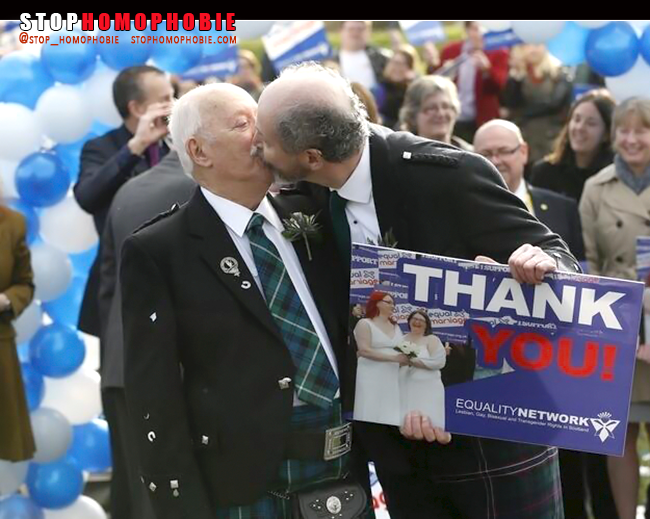>> Scotland legalizes gay marriage, becomes 17th country to do so
34 ans après avoir décriminalisé l’homosexualité, l’Écosse devient le 17éme pays à étendre l’ouverture de l’institution du mariage aux couples de même sexe, et la troisième nation du Royaume-Unis, après l’Angleterre et le Pays de Galles, l’année dernière, et des débats houleux entre les organismes religieux et les membres du Parlement.
Les premières noces homosexuelles devraient ainsi avoir lieu dès le début de l’automne : « un jour de fierté pour l’Ecosse » selon les échos de la population, un scandale pour l’Eglise catholique, qui pourra notamment, choisir ou pas sur le territoire d’unir également les couples religieusement
En 2012, le vice-Premier ministre écossais Nicola Sturgeon déclarait qu’il s’agissait du bon choix, à l’issue d’une consultation publique où 65% des opinions exprimées (sur un total de 80.000 personnes interrogées) se sont prononcées en faveur du mariage homosexuel, ainsi que tous les grands partis politiques.
Le projet de loi comporte également des dispositions pour permettre aux personnes transgenres de rester mariées tout en obtenant un certificat de reconnaissance de leur « transition », et s’étend également aux couples de même sexe, même si mariés à l’étranger.
A l’heure de Sotchi et des déclarations homophobes qui pullulent, c’est une très belle avancée. A noter que l’Écosse reconnaissait déjà l’adoption pour les couples de même sexe depuis 2009.
Terry G. STOP HOMOPHOBIE
>> In a landmark ruling for the United Kingdom, Scotland today passed marriage equality in its Parliament. Scotland is the third nation in the United Kingdom to do so, following England and Wales, which passed their same-sex marriage bill last year.
Thirty-four years after Scotland decriminalized homosexuality, this victory comes after heated debates between religious bodies and MSPs (members of the Scottish Parliament) since the first petition was drawn up in 2009. The marriage equality bill was formally introduced in the Scottish Parliament in June 2013, which eventually passed stage one of voting with a 98-15 victory with 5 abstentions in November 2013, and today finally passed with a victory of 105-18 with no abstentions.
Though same-sex couples had the option of civil unions, the Marriage and Civil Partnership Bill faced opposition from the two biggest Scottish church organizations – the Scottish Catholic Church and the Church of Scotland. The two bodies, along with a group of 48 other signatories, prompted members of the Scottish Parliament to add the now included amendments providing for non-discrimination of individuals and organizations based on their views (expressed or not) regarding support for heterosexual marriage. The exemptions currently also include the provision for religious institutions to opt-in if they wish to perform same-sex marriage ceremonies, and also offer a reassurance to churches and religious bodies that their charitable status won’t be disturbed irrespective of their views on same-sex marriage.
The bill also includes provisions to allow transgender people to remain married while obtaining a Gender Recognition Certificate, and extends recognition to same-sex couples married elsewhere.


















